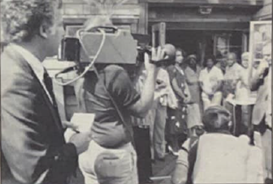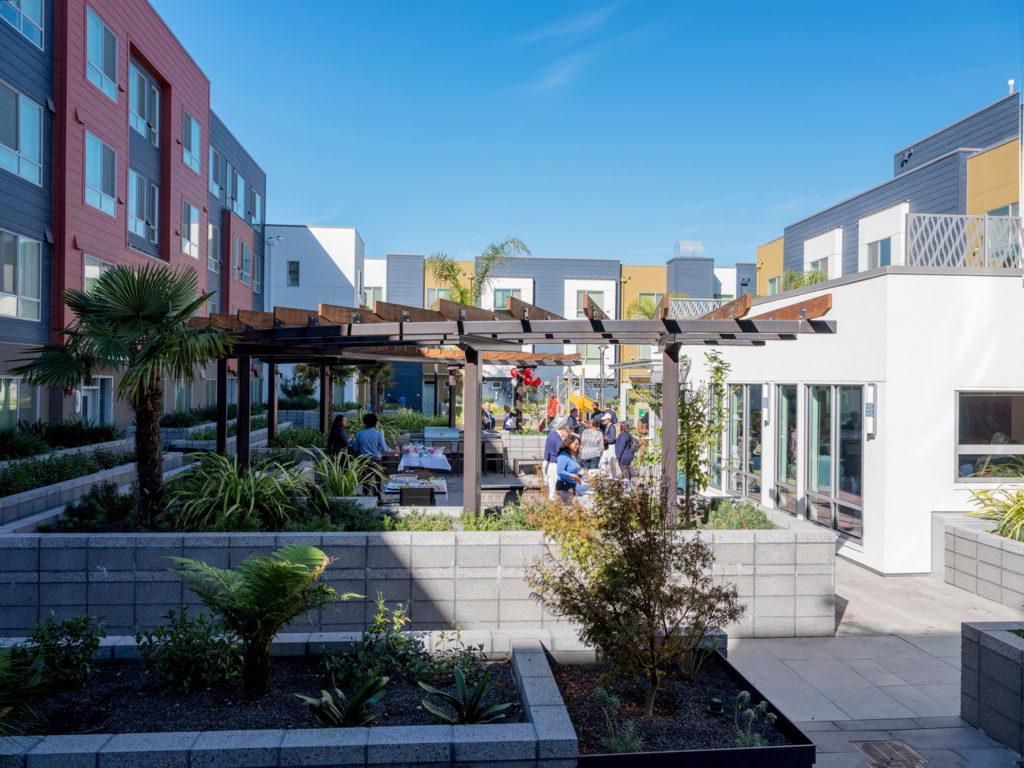The ache for home lives in all of us, the safe place where we can go as we are and not be questioned.
Maya Angelou, poet and longtime San Francisco resident
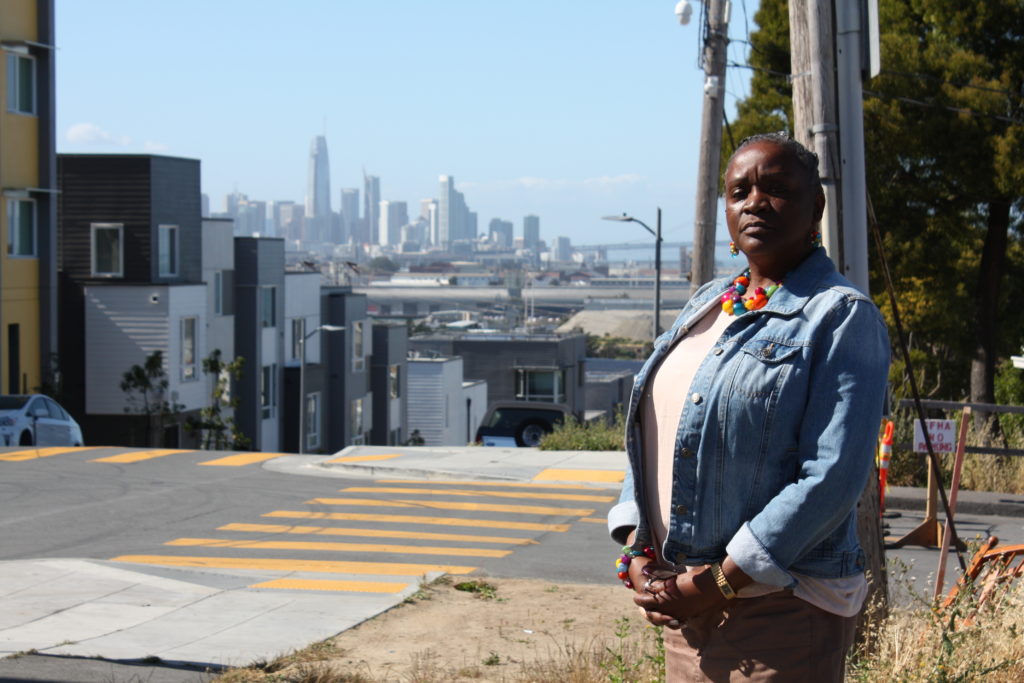
A Place To Call Home
Did you know?
The Council for Civic Unity, which SFF began supporting in the 1950s, made headlines in 1957 by helping San Francisco Giants star Willie Mays purchase a home soon after the Giants franchise moved from New York to San Francisco. Residents and builders in the Sherwood Forest neighborhood pressured the homeowner to refuse the sale because Mays was Black.
For 22 years, Lottie Titus lived in Hunters View’s “old side,” as locals call it nowadays, a 60-year-old public housing complex in Bayview-Hunters Point. There, Titus said, she and her family couldn’t use their bathtub because it was too rusted. In one of the emptier buildings, squatters moved in and sold drugs. Thieves often came in to steal metal from the building.
In 2017, Titus and her family moved 200 feet west from the old side of Middle Point Road to the “new side,” where a gorgeous mixed-income housing community now stands. Since 2012, many families have made this transformational journey and become the first residents of the new Hunters View, the first of four HOPE SF projects that SFF helped conceptualize in 2006 and, in subsequent years, helped bring to life.
Titus, who until her death in 2020 worked to help Hunters View seniors access health and wellness services, was the embodiment of a committed community leader who understood that housing is a key component of an inclusive Bay Area. “I love San Francisco,” she told SFF. “People like me want to stay, but in order to do that we need decent housing and wages. A well-rounded community grows, prospers and thrives.”
HOPE SF is one of many examples of our all-in housing strategy. Stable and affordable homes are essential to creating a diverse, vibrant and thriving Bay Area. Stable housing is better for people’s health, helps kids do better in school, allows residents to stay in their jobs and build wealth, and makes our communities more connected and successful.
Our Longstanding Work on Housing
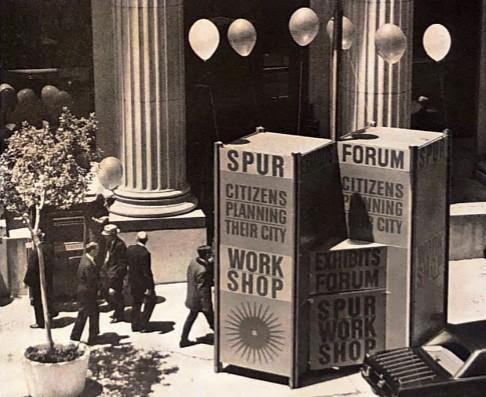
SFF has long recognized that having a safe place to call home is key to ensuring that everyone here thrives. The Bay Area has much to be proud of when it comes to preserving, protecting, and producing affordable homes. But it has also been responsible for creating and fiercely upholding racist and exclusionary housing policies, such as property deed clauses restricting anyone who is not white from buying or renting homes and Berkeley’s passage of the country’s first single-family zoning ordinance in 1916. Although Berkeley voted to end the policy by 2022, similar policies continue to segregate neighborhoods throughout the country.
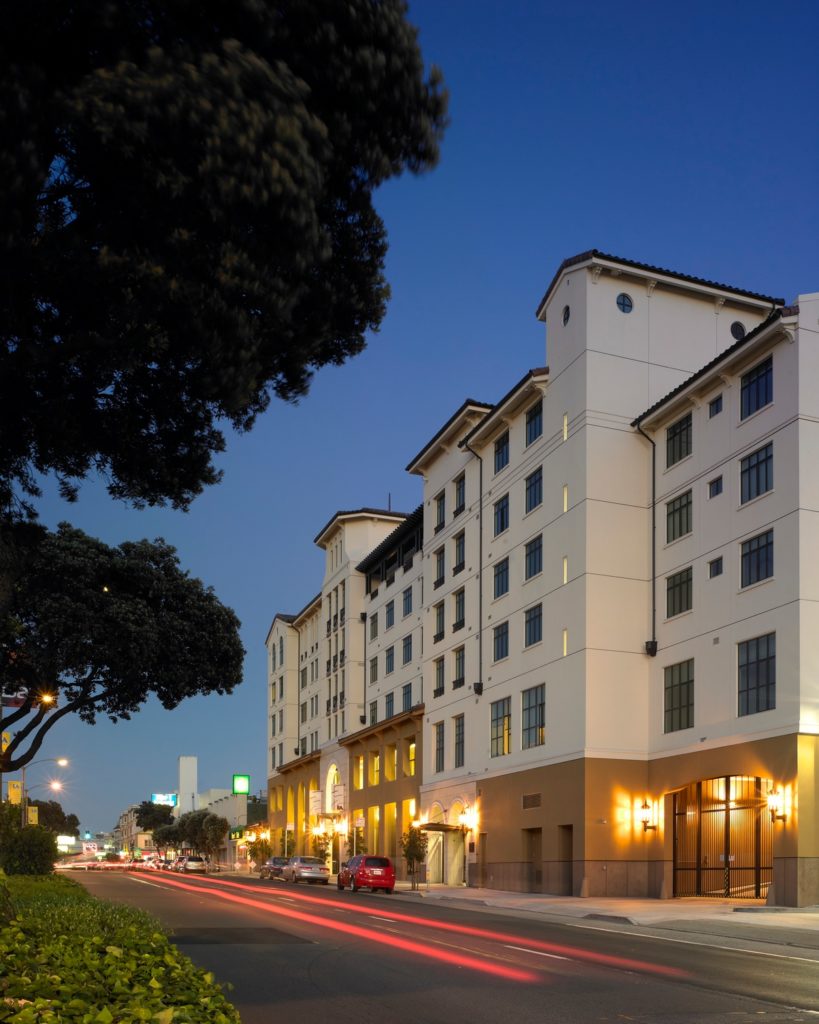
Did you know?
In 1985, we supported a documentary by KQED (an organization we seed-funded) that shed light on the city’s lesser-known public housing troubles. In this photo, longtime KQED reporter Spencer Michels (left) and a KQED crew film Oakland Mayor Lionel Wilson (far right) outside the Oakland Housing Authority.
In our first 20 years, SFF did not include housing as one of our issues, focusing instead on health (including mental health), children and youth, social welfare, education services “for the aged and handicapped,” international and intergroup relations, and civil and cultural affairs. It wasn’t until Martin Paley took the helm in 1974 that SFF began, in earnest, to address affordable housing in the Bay Area.
In 1981, SFF received an anonymous gift of $660,000 to seed the Bay Area Residential Investment & Development Group (BRIDGE) to attract investments to increase the area’s supply of affordable housing. It was an ambitious new approach to the region’s affordable housing needs, and the organization continues to grow in size and scale. In the past 40 years, BRIDGE Housing has built 18,000 affordable homes on the West Coast. In 2008, the son of late SFF donor Bill Brinton, an attorney and civic leader, spoke at BRIDGE’s 25-year anniversary celebration, revealing his father as the source of the organization’s seed funding.
“We brought together leadership from the community … who set forth and created BRIDGE, which exists today and is growing as we speak,” said former SFF Director Martin Paley in 2021. “It shows how the foundation can be involved in helping people apply the money in a creative way, and creating something that can go on and do an extraordinary job.”
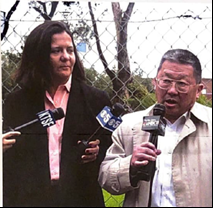
In 1989, the Loma Prieta earthquake destroyed more than 1,200 homes that had been built for people living on low incomes, pushing residents into shelters and onto the street. SFF organized a $2.5 million earthquake recovery fund and provided funds to Eden I&R Inc. and the Eden Council for Hope and Opportunity for emergency housing, as well as a phone line to connect landlords with prospective tenants.
By the mid-1990s, SFF reinforced our commitment to housing by adding a Neighborhood and Community Development program to our longstanding funding areas such as Community Health, Urban Affairs, Education, Arts and Humanities, and the Environment. Program officer Joe Brooks led the initiative, which helped build power within the unhoused community and supported nonprofit housing efforts such as BRIDGE and Mercy Housing, and current SFF CEO Fred Blackwell served as a Neighborhood and Community Development Fellow between 1996 and 1998. SFF’s board, too, was beginning to reflect our commitment to housing, with longtime housing advocate Mary Lee Widener serving on the board between 1988 and 1998.
Centering Equity in Public Housing
Did you know?
In 2016, SFF supported the passage of six affordable housing measures throughout the Bay Area, effectively bringing in billions of dollars to develop, protect and preserve affordable homes throughout the region.
One of our longest-running housing and community-driven investment programs is HOPE SF. The seeds of HOPE SF were planted in 2005, during CEO Sandra Hernández’s tenure, in response to a study by the San Francisco Human Services Agency that underscored the urgent need to rebuild obsolete public housing located in the city’s southeast neighborhoods. “HOPE SF was structured under a powerful cross-sector partnership between the foundation, the mayor’s Office of Housing, as well as Enterprise Community Development, all working together to ensure that every San Francisco resident can thrive in a safe home,” Hernández says.
HOPE SF addresses the question many community development efforts miss: investment in the neighborhood—but for whom? And with input from whom? HOPE SF has undoubtedly transformed homes; to date, the initiative has rebuilt and modernized 900 homes in San Francisco’s public housing sites, and by 2024, 600 more homes will be completed.
More importantly, however, resident leaders have transformed lives. Eighty percent of original HOPE SF residents have been able to stay through the redevelopment process and now enjoy the new community they’ve helped shape. That’s particularly impressive when compared to the 25% of residents nationwide who are typically able to stay when public housing is redeveloped.
From the start, the key to the initiative’s success has been consistently centering the leadership and voices of residents to transform lives, not just homes.
Did you know?
In 2019, the William and Flora Hewlett Foundation was looking for the best focus for its Bay Area grantmaking. As it consulted with leaders across the region, it became clear that the top issue was housing and that SFF was a key organization dealing with this issue. That year, the Hewlett Foundation made a significant five-year funding commitment to support our work on housing. In awarding the grant, Hewlett cited our strategies, leadership and impressive history in building coalitions, bringing communities together and working with diverse allies on the issue.
If you look at HOPE SF today, you see the vibrancy of residents and you see young people going to school and you see the conditions in beautifully rebuilt public housing. To me, that was laying the groundwork for more broadly looking at social justice issues and really leaning into them from a long-term point of view.
Former SFF CEO Sandra Hernández
Our All-In Approach to Housing Today
In the past two decades, the Bay Area’s housing affordability crisis has been exacerbated: first by the Great Recession caused by unregulated, unscrupulous lending practices, then by a lack of affordable housing due to inadequate protections and production, and then by a pandemic that has led even more residents—who are disproportionately people of color—to lose their homes.
Understanding that housing is fundamentally related to racial justice, SFF has doubled down on our housing work today like never before. CEO Fred Blackwell and Chief Impact Officer Judith Bell have strengthened the tools SFF has to tackle the issue. Blackwell served as the executive director of the San Francisco Redevelopment Agency and director of the Mayor’s Office of Community Development in San Francisco. Bell brings her deep experience in policy development, advocacy and community partnerships as the president of PolicyLink.
We see housing as a regional issue that requires regional solutions and a racial justice issue that requires equitable solutions. “My mother [Angela Glover Blackwell, founder of PolicyLink] taught me that if you’ve come up with a solution to a complex problem that only involves yourself, you either don’t understand the problem or you have the wrong solution,” Blackwell says.
Because housing inequalities are rooted in policies and practices, we have the collective power to change them. Through broad community engagement and research, we’ve determined that the best path to success is to focus on the three P’s:
- Protect renters and prevent unhoused conditions for those who need stable housing and relief from rising and unsustainable rents, a group that disproportionately includes Black and brown families.
- Preserve and renovate homes that are already affordable in our communities so they are not lost to the speculative market.
- Produce new homes with racial equity, belonging and affordability as our guiding influences.
SFF’s diverse array of housing-focused programs today will create large-scale, long-term solutions to these challenges. By bringing together donors, faith leaders, policymakers, researchers, community leaders and philanthropic and corporate funders, we can build a better Bay Area where all can thrive. If we’ve learned anything over the years, it’s that our housing challenge is continuously evolving—we face new and not-so-new challenges with each decade. But the Bay Area’s housing inequities are rooted in the rules we created, which means we also have the power to change them.

